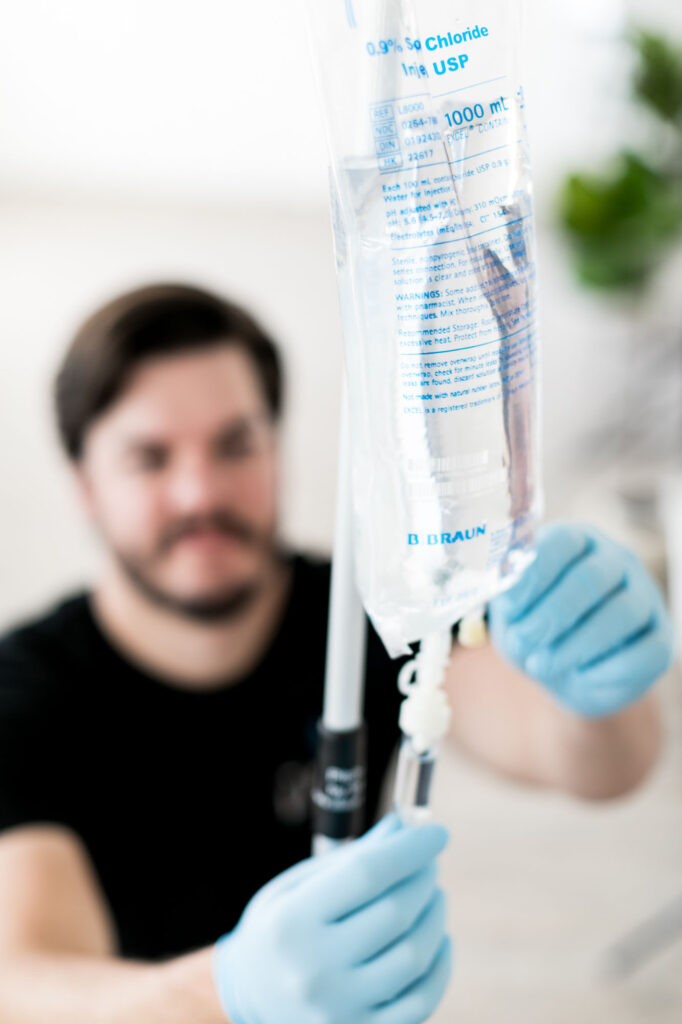LIQUID IV VS IV INFUSION: WHICH IS BETTER FOR HYDRATION?
Proper hydration is essential for our overall health and well-being, as it helps regulate body temperature, transport nutrients, and flush out toxins. Dehydration can lead to various health problems such as fatigue, headaches, and even organ damage. To combat dehydration, there are several options available, including Liquid IV and IV Infusion. But, of Liquid IV vs IV Infusion which is better for hydration?
Liquid IV is a popular hydration supplement that claims to provide more hydration than water alone. It contains a blend of electrolytes, vitamins, and minerals that can help replenish the body’s fluids.
On the other hand, IV Infusion is a medical procedure that involves the intravenous administration of fluids, electrolytes, and other nutrients directly into the bloodstream. It is commonly used to treat dehydration and other medical conditions.
In this article, we’ll explore the differences between these two hydration methods to help you decide which one is right for you.
Liquid IV
What is Liquid IV?
Liquid IV is a hydration supplement that claims to provide faster and more effective hydration than water alone. It comes in the form of a powder that is mixed with water to create a flavored drink.
The company behind Liquid IV claims that its product can hydrate the body up to three times faster than water alone, making it a popular choice for athletes, travelers, and anyone looking to boost their hydration levels.
Definition
Liquid IV is a type of oral rehydration solution (ORS) that contains a specific blend of electrolytes, vitamins, and minerals designed to replenish the body’s fluids. It is commonly used to treat mild to moderate dehydration caused by sweating, exercise, or illness.

Composition
The main ingredients in Liquid IV include:
- Sodium: helps regulate fluid balance and aids in muscle and nerve function
- Potassium: essential for proper muscle and nerve function and helps regulate blood pressure
- Glucose: provides energy for the body and helps the absorption of electrolytes
- Vitamin C: a powerful antioxidant that supports immune function and helps with collagen production
- B vitamins: essential for energy production and nerve function
- Zinc: important for immune function and wound healing
The specific amount of each ingredient may vary depending on the flavor and type of Liquid IV product.

How does Liquid IV work?
Explanation of the science behind Liquid IV
Liquid IV works by using a specific formula of electrolytes and nutrients that are designed to enhance water absorption and retention in the body.
When mixed with water, the powder dissolves and creates a solution that has a higher concentration of electrolytes and nutrients than plain water.
How Liquid IV helps with hydration
The higher concentration of electrolytes and nutrients in Liquid IV helps the body absorb and retain more water than it would with plain water alone. Electrolytes like sodium and potassium help regulate fluid balance in the body, while glucose helps the absorption of electrolytes and provides energy to the body.
Additionally, the vitamins and minerals in Liquid IV can help support immune function and energy production, which can be especially helpful during times of dehydration or illness. Overall, the combination of electrolytes, nutrients, and water absorption enhancers in Liquid IV is designed to provide faster and more effective hydration than water alone.
Benefits of Liquid IV
Some of the benefits of using Liquid IV include:
Increased hydration
As previously mentioned, Liquid IV is designed to provide faster and more effective hydration than water alone.
By using a specific blend of electrolytes, glucose, and water absorption enhancers, Liquid IV can help the body absorb and retain more water, which can help prevent dehydration and its associated symptoms.
Enhanced energy
The B vitamins in Liquid IV can help support energy production in the body, which can be especially helpful during times of physical activity or when recovering from illness.
Additionally, the glucose in Liquid IV can provide a quick source of energy to the body, which can help combat fatigue and sluggishness.
Improved immune system
The vitamin C and zinc in Liquid IV can help support immune function, which is essential for overall health and well-being.
Vitamin C is a powerful antioxidant that can help protect the body from harmful free radicals, while zinc is important for immune function and wound healing.
Overall, the combination of electrolytes, glucose, B vitamins, vitamin C, and zinc in Liquid IV can provide a range of benefits for those looking to improve their hydration levels, energy levels, and immune function.
Drawbacks of Liquid IV
While Liquid IV can provide a range of benefits, there are also some drawbacks to consider:
Possible side effects
Like any supplement, Liquid IV may cause side effects in some individuals. Common side effects of Liquid IV include diarrhea, bloating, and stomach cramps.
If you experience severe or persistent side effects, it’s important to stop using Liquid IV and consult with a healthcare professional.
Not suitable for everyone
Liquid IV may not be suitable for everyone, especially those with certain medical conditions or who are taking certain medications.
For example, individuals with kidney disease or high blood pressure may need to limit their intake of certain electrolytes, which are present in high amounts in Liquid IV.
Additionally, some medications may interact with the ingredients in Liquid IV, which could cause adverse effects. It’s always important to talk to a healthcare professional before starting any new supplement or medication.
IV Infusion
What is IV Infusion?
IV infusion is a medical treatment that involves delivering fluids, medications, or nutrients directly into a patient’s bloodstream through a vein. This is typically done using an IV catheter, which is inserted into a vein in the arm or hand.
Composition
The composition of IV infusions can vary widely depending on the reason for the treatment. Some common types of IV infusions include:
- Saline solution: This is a solution of sterile salt water that is often used to replenish fluids and electrolytes in the body.
- Medications: Some medications are administered via IV infusion, including pain medications.
- Nutrients: In some cases, IV infusions may be used to provide nutrients directly into the bloodstream. For example, IV infusions of vitamins and minerals may be used to treat malnutrition or vitamin deficiencies.
Overall, IV infusion is a medical treatment that can be used for a variety of purposes, depending on the patient’s needs.
How does IV Infusion work?
IV infusion works by delivering fluids, medications, or nutrients directly into a patient’s bloodstream through a vein. This allows for rapid and precise delivery of these substances to the body, which can be especially important in certain medical situations.
During IV infusion, a small catheter is inserted into a vein in the arm or hand. The catheter is then connected to a bag or bottle of the fluid, medication, or nutrient to be delivered. The bag or bottle is elevated to allow gravity to help the fluid flow through the catheter and into the bloodstream.
IV infusion can be used for a variety of purposes, including:
- Replenishing fluids and electrolytes in the body
- Administering medications directly into the bloodstream
- Providing nutrients to the body when oral intake is not possible
How IV Infusion helps with hydration
IV infusion can be an effective way to help with hydration in certain medical situations, such as severe dehydration or electrolyte imbalances.
By delivering fluids and electrolytes directly into the bloodstream, IV infusion can help replenish the body’s fluids and electrolytes more quickly than oral intake.
In addition to providing hydration, IV infusion can also be used to deliver medications or nutrients to the body, which can be especially important for individuals who are unable to take these substances orally.
For example, individuals with severe nausea or vomiting may be unable to take medications or nutrients orally, but can receive them via IV infusion.
Overall, IV infusion is a medical treatment that can be used to deliver fluids, medications, or nutrients directly into the bloodstream. This can be especially important in certain medical situations where rapid and precise delivery is needed.

Benefits of IV Infusion
IV infusion can offer a range of benefits, depending on the reason for the treatment. Here are some potential benefits of IV infusion:
Rapid hydration
IV infusion can help rapidly replenish fluids and electrolytes in the body. This can be especially important in situations where oral intake of fluids is not possible or not effective, such as in cases of severe dehydration.
Enhanced recovery
IV infusion can also be used to deliver medications or nutrients directly into the bloodstream, which can help enhance recovery from certain medical conditions.
For example, IV infusion of antibiotics can be a highly effective treatment for infections, while IV infusion of vitamins and minerals can help address malnutrition or vitamin deficiencies.
Boosted energy
In some cases, IV infusion of nutrients or vitamins can also help boost energy levels. This is because these substances are delivered directly into the bloodstream, allowing for more rapid and efficient absorption by the body.
Overall, IV infusion can be a highly effective medical treatment for a range of conditions, including dehydration, infections, and nutrient deficiencies.
By delivering fluids, medications, and nutrients directly into the bloodstream, IV infusion can help rapidly replenish the body’s resources and promote enhanced recovery.
Overall, while IV infusion can be a highly effective medical treatment in certain situations, it is important to consider the potential drawbacks, including the invasive nature of the procedure, the risk of infection, and the cost of the treatment.
Liquid IV vs IV Infusion: Which is better for hydration?
When it comes to hydration, both Liquid IV and IV infusion can be effective methods for replenishing fluids and electrolytes in the body. However, there are some key differences between the two treatments to consider. Here is a detailed comparison of Liquid IV and IV infusion:
Method of delivery
Liquid IV is a powder that is mixed with water and consumed orally, while IV infusion involves the insertion of a catheter into a vein in the arm or hand to deliver fluids, medications, or nutrients directly into the bloodstream.
Speed of hydration
IV infusion is generally considered to be a faster method of hydration than Liquid IV. Because the fluids and electrolytes are delivered directly into the bloodstream, they are rapidly absorbed by the body, which can help to quickly replenish fluids and electrolytes.
Customizability
IV infusion can be more customizable than Liquid IV. With IV infusion, healthcare providers can tailor the fluids, medications, and nutrients being delivered to the individual’s specific needs. With Liquid IV, the composition of the powder is fixed and cannot be adjusted.
Accessibility
Liquid IV is generally more accessible than IV infusion. While IV infusion must be administered by a healthcare professional, Liquid IV can be purchased over the counter and consumed at home.
Cost
IV infusion can be more expensive than Liquid IV. This is because IV infusion involves the use of medical equipment and must be administered by a healthcare professional, while Liquid IV can be purchased at a lower cost and consumed at home.
Overall, both Liquid IV and IV infusion can be effective methods for hydrating the body. The choice between the two treatments will depend on individual needs and preferences.
For individuals who need rapid hydration or require a customizable treatment plan, IV infusion may be the better option. For individuals who prefer a more accessible and cost-effective option, Liquid IV may be a better choice.
When to Choose IV Infusion
While both Liquid IV and IV infusion can be effective methods for hydration, there are certain situations where IV infusion may be the preferred option. Here are some examples:
Dehydration
IV infusion may be preferred for individuals who are severely dehydrated or unable to drink fluids due to illness or injury. In these situations, IV infusion can provide rapid hydration and help to prevent complications associated with dehydration.
Electrolyte Imbalances
IV infusion can be effective in treating electrolyte imbalances, such as low sodium or potassium levels. By delivering fluids and electrolytes directly into the bloodstream, IV infusion can help to quickly restore balance and prevent complications.
Medical Conditions
IV infusion may be preferred for individuals with certain medical conditions that require specialized treatment. For example, individuals with cancer may require IV infusion to receive chemotherapy drugs, while individuals with kidney disease may require IV infusion to manage their condition.
Advantages of IV Infusion over Liquid IV
While both Liquid IV and IV infusion can be effective methods for hydration, there are some advantages to choosing IV infusion over Liquid IV. Here are some examples:
Rapid Hydration
IV infusion can provide rapid hydration, making it an effective option for individuals who need to quickly replenish fluids and electrolytes.
Customizability
IV infusion can be tailored to an individual’s specific needs, including the type and amount of fluids, medications, or nutrients being delivered.
Medical Supervision
IV infusion is typically administered under medical supervision, which can provide peace of mind for individuals who require specialized medical care.
Overall, while IV infusion may not be the best choice for everyone, it can provide significant benefits for individuals with specific medical needs or who require rapid hydration.
When to Choose IV Infusion
While both Liquid IV and IV infusion can be effective methods for hydration, there are certain situations where IV infusion may be the preferred option. Here are some examples:
Dehydration
IV infusion may be preferred for individuals who are severely dehydrated or unable to drink fluids due to illness or injury. In these situations, IV infusion can provide rapid hydration and help to prevent complications associated with dehydration.
Electrolyte Imbalances
IV infusion can be effective in treating electrolyte imbalances, such as low sodium or potassium levels. By delivering fluids and electrolytes directly into the bloodstream, IV infusion can help to quickly restore balance and prevent complications.
Medical Conditions
IV infusion may be preferred for individuals with certain medical conditions that require specialized treatment. For example, individuals with cancer may require IV infusion to receive chemotherapy drugs, while individuals with kidney disease may require IV infusion to manage their condition.
Advantages of IV Infusion over Liquid IV
While both Liquid IV and IV infusion can be effective methods for hydration, there are some advantages to choosing IV infusion over Liquid IV. Here are some examples:
Rapid Hydration
IV infusion can provide rapid hydration, making it an effective option for individuals who need to quickly replenish fluids and electrolytes.
Customizability
IV infusion can be tailored to an individual’s specific needs, including the type and amount of fluids, medications, or nutrients being delivered.
Medical Supervision
IV infusion is typically administered under medical supervision, which can provide peace of mind for individuals who require specialized medical care.
Overall, while IV infusion may not be the best choice for everyone, it can provide significant benefits for individuals with specific medical needs or who require rapid hydration.
Cost Comparison
One factor to consider when comparing Liquid IV and IV infusion is the cost. Here is a breakdown of the typical cost for each method:
Liquid IV
A single serving of Liquid IV typically costs around $1.50 to $2.50, depending on where it is purchased. A box of 16 packets typically costs around $25.
IV Infusion
IV infusion is a medical procedure that requires specialized equipment and medical personnel, making it more expensive than Liquid IV.
The cost of IV infusion can vary widely depending on factors such as the location, type of infusion, and length of treatment. On average, a single IV infusion session can cost anywhere from $100 to $500 or more.
Lorem ipsum dolor sit amet, consectetur adipiscing elit. Ut elit tellus, luctus nec ullamcorper mattis, pulvinar dapibus leo.
Which is More Cost-Effective?
When it comes to cost-effectiveness, Liquid IV is generally the more affordable option.
However, it’s important to consider the specific situation and needs of the individual. In some cases, such as when rapid hydration or specialized medical treatment is necessary, the benefits of IV infusion may outweigh the additional cost.
Ultimately, the decision between Liquid IV and IV infusion should be based on an individual’s specific needs and budget.
Liquid IV Safety and Side Effects
While Liquid IV is generally considered safe for most people, there are a few possible side effects and precautions to keep in mind.
Possible Side Effects of Liquid IV
Some people may experience mild side effects when using Liquid IV, such as:
- Nausea
- Upset stomach
- Headache
- Dizziness
- Diarrhea
These side effects are usually mild and go away on their own after a short time. If you experience any severe or persistent side effects, stop using Liquid IV and consult your healthcare provider.
Precautions to Take When Using Liquid IV
To minimize the risk of side effects, it’s important to follow the recommended dosage and usage instructions for Liquid IV. It’s also important to drink plenty of water throughout the day to ensure proper hydration.
If you have any medical conditions or are taking any medications, it’s important to talk to your healthcare provider before using Liquid IV. In some cases, Liquid IV may not be suitable for certain individuals, such as those with kidney or liver problems.
Overall, Liquid IV is considered a safe and effective way to stay hydrated, but it’s important to use it responsibly and consult with your healthcare provider if you have any concerns.
IV Infusion Safety and Side Effects
IV infusion is generally considered safe when performed by a trained healthcare professional, but there are some potential side effects and precautions to keep in mind.
Possible Side Effects of IV Infusion
Some people may experience mild to moderate side effects when undergoing IV infusion, such as:
- Pain or discomfort at the injection site
- Swelling or bruising at the injection site
- Nausea or vomiting
- Headache
- Dizziness or lightheadedness
- Infection
Serious side effects of IV infusion are rare but can include:
- Allergic reaction
- Bleeding or blood clot
- Damage to the vein or surrounding tissue
If you experience any severe or persistent side effects during or after IV infusion, seek medical attention immediately.
Precautions to Take When Undergoing IV Infusion
It’s important to inform your healthcare provider of any medical conditions or medications you are taking before undergoing IV infusion.
After the procedure, it’s important to monitor the injection site for any signs of infection or other complications. If you experience any symptoms such as fever, redness, or swelling at the injection site, contact your healthcare provider immediately.
Overall, IV infusion is considered a safe and effective way to receive specialized medical treatment, but it’s important to follow all safety precautions and communicate with your healthcare provider throughout the process.
Frequently Asked Questions
Here are some common questions about Liquid IV and IV Infusion:
Liquid IV is a powder mix that is added to water and consumed orally. It contains a blend of electrolytes, vitamins, and minerals that help to hydrate the body. IV infusion, on the other hand, is a medical procedure where fluids and nutrients are administered directly into the bloodstream through an IV (intravenous) line.
Both Liquid IV and IV infusion can effectively hydrate the body, but IV infusion provides a more rapid and intense hydration than Liquid IV. IV infusion is often recommended for individuals who are severely dehydrated or unable to absorb fluids orally.
Both Liquid IV and IV infusion have potential side effects, such as allergic reactions, infection, and damage to the veins or surrounding tissue. It’s important to follow all safety precautions and consult with a healthcare provider before using either product.
The choice between Liquid IV and IV infusion depends on several factors, such as the severity of dehydration, the individual’s medical history and current health condition, and personal preferences. It’s important to consult with a healthcare provider to determine the best option for your specific needs.
Liquid IV is generally more cost-effective than IV infusion, as it is a non-invasive and over-the-counter product. IV infusion requires medical supervision and administration, which can make it more expensive. However, the cost may vary depending on the individual’s insurance coverage and location.
Conclusion
Both Liquid IV and IV infusion are effective methods of hydration, but they have distinct differences in terms of their composition, administration, and benefits.
Liquid IV is a non-invasive and affordable option for individuals looking to boost their hydration levels, while IV infusion is a medical procedure recommended for individuals who are severely dehydrated or unable to absorb fluids orally.
When choosing between Liquid IV and IV infusion, it’s important to consider factors such as the severity of dehydration, personal preferences, and medical history. Consulting with a healthcare provider can help determine the best option for your specific needs.
Final Thoughts: Liquid IV vs IV Infusion
Whether you choose Liquid IV or IV infusion, it’s important to prioritize hydration for overall health and wellbeing.
Drinking plenty of water and staying hydrated can help boost energy levels, improve immune function, and enhance physical performance.

Drip Admin
Drip Admin has written several informative articles and guides on the benefits of IV therapy, emphasizing the science behind the practice. Our writing style is engaging, concise, and accessible, making complex medical concepts easily understandable for readers.

